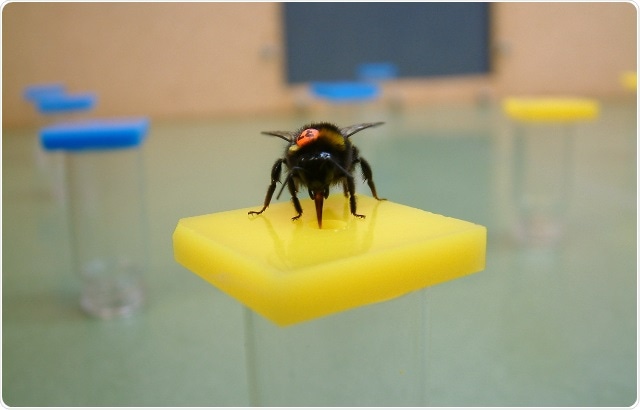Recent research headed by researchers from Jiangnan University, China in association with scientists from the Queen Mary University of London and the University of Oulu, Finland, demonstrated that a species of gut bacteria, called Lactobacillus apis, is connected to improved memory in bumblebees.

Bumblebee on artificial flower. Image Credit: Tom Ings.
The scientists identified that bumblebees with these types of bacteria in their guts have enhanced memory than the ones with lesser bacteria. Bumblebees ingesting food containing this species of gut bacteria also displayed more long-lasting memories than the ones with normal diets.
The observations of the research add to increasing evidence that the gut microbiome—the numerous microorganisms that thrive in human intestines—can impact animal behavior. The research was published in the Nature Communications journal.
Testing memory and learning
To analyze the bees’ memory and learning capabilities, the scientists created variously colored artificial flowers—five colors were linked with sweet sucrose solution and the other five with a bitter-tasting solution having quinine, a bee repellent.
The scientist then noted how fastly the bees could learn which colors were linked with a sugar reward. They also analyzed if the bees could retain this information in a follow-up test that was carried out three days later. The researchers compared the individual differences in bumblebees’ learning and memory capabilities with the number of distinct bacteria seen in their gut by sequencing gut samples from the bees.
To assure that the amount of Lactobacillus apis in the gut was directly responsible for the noticed differences in memory, the scientists introduced these bacteria to the bumblebees’ diet and analyzed their responses to the same task.
The bees’ cognitive capabilities differ across individuals and they have a comparatively small community of gut microbes compared to mammals. This makes them ideal models to analyze the role of certain gut bacteria on differences in cognition between individuals.
The scientists remark that these variations in the microbiome noted across individual bumblebees might be due to the differences or changes in activities, nest environment, social interactions, pathogens, and pollination environment.
Our results suggest not only that the natural variation in the amount of a specific gut bacterium effects memory, but also show a causal link—that by adding the same bacterial species to a bee’s diet can enhance their memories. Further research will be required to determine if and which bacteria species might have the same effect in humans. But our work has shone a bright light on this possibility.”
Dr Li Li, Study Lead Author and Postdoctoral Researcher, Jiangnan University
“This is a fascinating finding that could apply to humans as well as to bees. Our findings add to growing evidence of the importance of gut-brain interactions in animals and provide insights into the cause of cognitive differences in natural bumblebee populations,” states Professor Lars Chittka, co-author of the study from Queen Mary University of London.
It’s amazing to find out the specific memory-enhancing bacteria species. The results further validate our belief that we may improve our cognitive ability via the regulation of gut microbiota.”
Wei Zhao, Professor, Study Corresponding Author and Head, Enzymology Lab, Jiangnan University